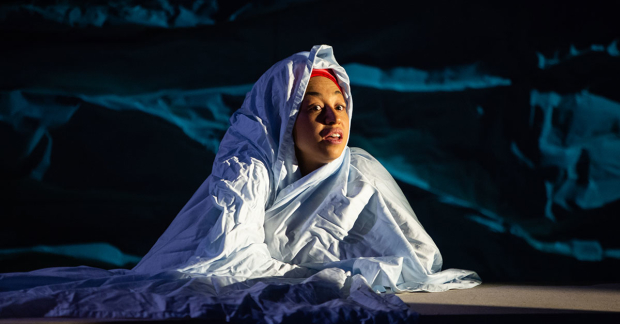Review: Going Through (Bush Theatre)
Kirsten Hazel Smith translates Estelle Savasta’s play about two women’s journey across borders

© Ali Wright
A young girl is smuggled into Britain from a conflict-ridden land in Going Through: an innovative and finely-produced show which marks this country's first adaptation of the French play Traversée. The story is there to put human faces on asylum seekers; it speaks of all the dangers that women, particularly, decide to flee from, as well as the immense risks they face during their escape.
Kirsten Hazel Smith translates from the original work by Estelle Savasta. Told through a combination of sign language, spoken English, and text projected onto walls, the play aspires to be an inclusive and multilingual experience that sweeps you along a journey. With lesser talents on stage, the setup might be bamboozling – but Nadia Nadarajah and Charmaine Wombwell give engaging, urgent performances that rarely let up.
They play the young Nour (Wombwell) and her adoptive mum Youmna (Nadarajah). The latter is deaf so they communicate by sign language. The tender, humour-filled opening scenes see them developing a code unique to them. It's both a bonding tool and a defence mechanism against the babble and violence of the world outside. This all implies that, yes, language can be oppressive – but can also be turned into a nifty tool for play and subversion.
And plenty of borders and boundaries will indeed be ignored before the 75-minute story is up. Events in the homeland dictate that it is soon time to entrust Noor to people-traffickers, with their perilous passageways to Britain. Noor dresses up as a boy to make the journey – and it is ironic that this transgressive act of masculinity comes to define her passage into womanhood.
Nadarajah's Youmna has a lovely silent mysticism and expressiveness: she even offers a little shadow-puppetry in front of the show's simple backdrop (a scrunched-up sheet that evokes mountains or sand dunes). She is a little under-employed during the story's latter stages – an issue fundamental to the play rather than to the direction of Omar Elerian. It's an obvious point, but a story about communication thrives when its two performers are bouncing off one another.
It means that the play feels like one of multiple, quite disparate parts – with the closing stages dedicated to Noor, solely, and her new life in Britain. Here, it's bye-bye to the men in the Middle East with big guns; hello to the British anti-terror police with big guns – and even the "go home" vans deployed by the Home Office so infamously in 2013. We are left with a lingering sense of the futility of refuge. Going Through is many things: an unusual coming-of-age tale and a feminist piece about self-expression. And at the very end, it also packs a political punch.








![Gillian Anderson, Jim Broadbent, Ian McKellen, Judi Dench, Damian Lewis and more to star in <em>Whodunnit [Unrehearsed]</em>](https://www.whatsonstage.com/wp-content/uploads/sites/3/2023/06/133883-1.jpg?w=100)










